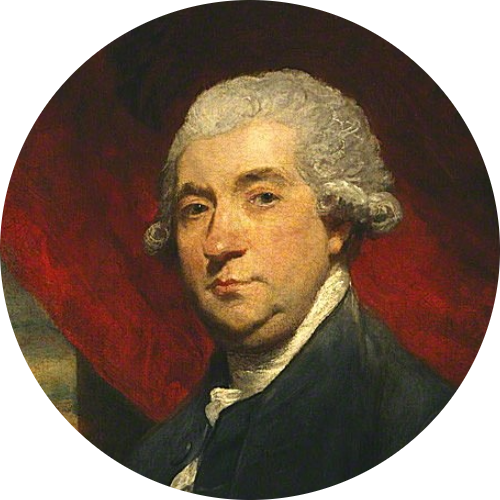Scottish lawyer, historian and antiquarian. Son of Sir James Dalrymple (1692-1751), 2nd Bart of Hailes and Lady Christian Hamilton (d. 1770). He was married twice, first to Anne Brown (d. 1768), daughter of Lord Coalston, and secondly to Helen Ferguson (d. 1810), daughter of Lord Kilkerran. Educated at Eton and Utrecht (Law). Advocate Depute (1755-?). Appointed Judge in the Court of Session in 1766. Elevated to the bench in 1766 as Lord Hailes. Appointed Lord of Justiciary in 1776. Grand Master of the Masonic Grand Lodge of Scotland (1774-1776). He lived at Newhailes1 in East Lothian, where he had an extensive library described by Dr Johnson as “the most learned room in Europe.”
Dalrymple published several books on a variety of subjects, including Historical Memoirs concerning the Provincial Councils of the Scottish Clergy (1769), An Examination of some of the Arguments for the High Antiquity of Regiam Majestatem (1769), Annals of Scotland from the Accession of Malcolm Canmore to the Accession of the House of Stuart (2 vols. published 1776 and 1779), Remains of Christian Antiquity (3 vols. published 1776, 1778 and 1780) and Disquisitions concerning the Antiquities of the Christian Church (1783). A memoir of his life is prefixed to the 1808 edition of his An Inquiry into the Secondary Causes which Mr Gibbon has assigned for the Rapid Growth of Christianity (1786).
A biography gives him the following praise:
"Of the character of lord Hailes, there can be but one opinion. As an able lawyer and an upright judge, he stands eminently conspicuous in an age and a country where such characters were not rare, and when the exercise of such qualities, from their superabundance, scarcely could merit praise. As a man of general erudition, he stands, if we except Warburton, almost without a rival in the age he lived in. His skill in classical learning, the belles lettres, and historical antiquities, especially those of his own country, have been universally admitted, and had popularity been his intention, as it was of too many of his contemporaries, there cannot be a doubt but that he could have made himself the most shining meteor among them."2
Dalrymple was a friend of both James Boswell and his father Alexander Boswell and occasionally acted as a mediator between them.3
JB respected him highly, and in his journal of February 10, 1763, wrote "I [...] wrote to him, telling him how my affairs went on, and that I wanted to be rationally happy, yet easy and gay, and hoped he would take a charge of me; would let me know what books to read, and what company to keep, and how to conduct myself." , and that he (Boswell) considered Dalrymple "a representative of Mr. Addison". Boswell was referring to Joseph Addison (1672-1719), publisher of The Spectator (1711-1712), a periodical which Boswell had read and admired much.
When he received a positive response from Dalrymple it gave him "much satisfaction and a good opinion of myself, to find that a man of so much true worth and even piety had my interest at heart and was willing to keep a correspondence with me."4
In a letter to Boswell of December 2, 1763, Dalrymple described his own state of mind as follows: "I am happy; I go my way in peace; I apply myself to the duties of society, and in filling the empty places of my brain with useful studies, I close it to metaphysical chimeras. Do thou likewise, my dear friend, and be happy; as happy as your very humble and most affectionate Dav: Dalrymple".
[1764-1766 ?]
On August 29, 1766, Dalrymple sent Boswell advice on his plans to publish an account of his journey to Corsica in 1765. Concerning the name of Pasquale Paoli he wrote "Paschal is more pleasing to an English ear than Pasquale" and probably remembering Boswell's publishing schemes of the early 1760s - and still referring to Paoli - he continued "remember he is the chief figure, he must come forward; the others, even yourself, must keep back."5
On August 17, 1773, Dalrymple came to dinner at Boswell's in Edinburgh, during Dr Johnson's stay there, shortly before Boswell and Johnson set out on their tour of Scotland. Also present were Sir Alexander Dick, John Maclaurin and Dr James Gregory. According to Boswell, in Journal of a Tour to the Hebrides, "[Dalrymple], who is one of the best philologists in Great Britain, who has written papers in the World, and a variety of other works in prose and in verse, both Latin and English, pleased [Dr Johnson] highly." He went on to describe their conversation in some detail, including how Dalrymple was able to point out passages by Dr Johnson in a law paper otherwise ascribed to Boswell.
Some of David Dalrymple's writings can be found via the AbeBooks used books search engine. Search for author David Dalrymple, and ignore the modern titles about Marriage and Organic Chemistry. And note that the Sir David Dalrymple who published a few titles between 1705 and 1721 was the 1st Lord Hailes, David's grandfather and sometime Lord Advocate.
